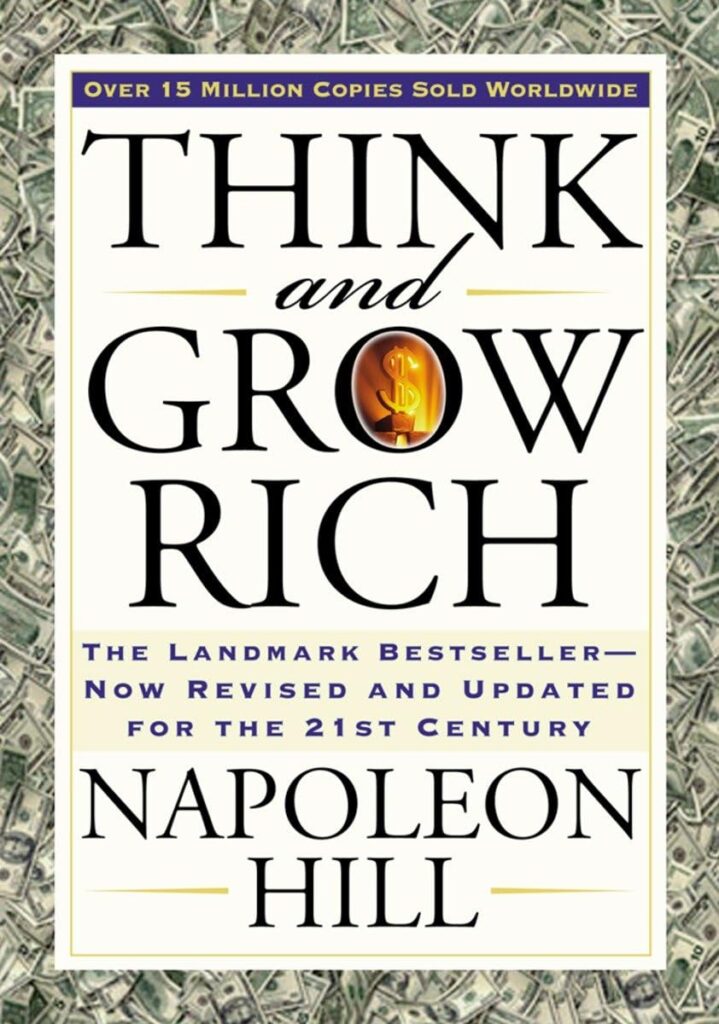“Think and Grow Rich,” written by Napoleon Hill and first published in 1937, has become one of the most influential personal development books of all time. Drawing from Hill’s extensive research on successful individuals, including Andrew Carnegie, Thomas Edison, and Henry Ford, the book distills the principles of success into actionable steps. Here are some of the key lessons from Hill’s seminal work
1. The Power of Thought
At the core of Hill’s philosophy is the idea that thoughts are powerful. He asserts that everything begins with a thought. By focusing on positive, wealth-oriented thoughts, individuals can shape their reality. The famous quote, “Whatever the mind can conceive and believe, it can achieve,” encapsulates this principle. It emphasizes the need to cultivate a mindset geared towards success.
2. Definiteness of Purpose
Hill stresses the importance of having a clear and specific goal. A “definite purpose” serves as a guiding star, motivating individuals to take the necessary actions to achieve their objectives. Hill encourages readers to write down their goals, creating a roadmap that keeps them focused and accountable. This clarity helps to channel energy and efforts toward the desired outcome.
3. Faith and Belief
Belief in oneself and one’s abilities is crucial for success. Hill emphasizes that faith is not merely a passive feeling but an active force that influences outcomes. By cultivating unwavering faith in their goals, individuals can overcome obstacles and challenges. Hill advocates for the use of affirmations and visualization techniques to strengthen this belief.
4. Autosuggestion
Closely related to the power of thought, autosuggestion involves repeatedly affirming one’s goals and beliefs to influence the subconscious mind. Hill suggests that by consciously choosing positive affirmations and visualizing success, individuals can reprogram their thoughts and behaviors, aligning them with their goals. This practice creates a self-fulfilling prophecy, where belief leads to action.
5. Specialized Knowledge
Hill argues that general knowledge is not enough to achieve success. Instead, individuals should seek specialized knowledge relevant to their goals. This may involve formal education, self-study, or mentorship. The key is to continually learn and adapt, leveraging knowledge as a tool for growth and innovation.
6. Imagination
Imagination is a critical component of success. Hill encourages readers to use their creativity to visualize new ideas and solutions. The ability to innovate and think outside the box can set individuals apart in a competitive landscape. Hill outlines two forms of imagination: synthetic (combining existing concepts) and creative (developing entirely new ideas).
7. Organized Planning
A clear plan is essential for transforming dreams into reality. Hill emphasizes the need for organized planning, which involves breaking down goals into actionable steps. A well-structured plan helps individuals stay on track and adapt as circumstances change. Hill also highlights the importance of persistence in executing these plans, even in the face of setbacks.
8. Mastermind Alliance
Hill advocates for the creation of a “mastermind group,” a collective of like-minded individuals who support and challenge each other. Collaborating with others fosters creativity, accountability, and resource-sharing. By surrounding oneself with motivated and knowledgeable people, individuals can enhance their potential for success.
9. Persistence
Persistence is a recurring theme in Hill’s work. He argues that many individuals fail not because of a lack of talent or intelligence but due to a lack of perseverance. Hill encourages readers to cultivate resilience, emphasizing that success often comes to those who refuse to give up despite obstacles and challenges.
10. The Subconscious Mind
The subconscious mind plays a vital role in shaping behavior and outcomes. Hill posits that the subconscious can be influenced by thoughts, emotions, and experiences. By consciously feeding the subconscious with positive thoughts and affirmations, individuals can align their actions with their goals, enhancing their likelihood of success.
11. The Brain and the Sixth Sense
Hill likens the brain to a broadcasting and receiving station for thoughts. He believes that individuals can tap into a higher level of intuition or a “sixth sense” that guides them toward opportunities and ideas. This intuition often arises from a well-developed subconscious mind, capable of synthesizing information and experiences in profound ways.
12. Overcoming Fear
Fear is a significant barrier to success. Hill identifies six basic fears—poverty, criticism, ill health, loss of love, old age, and death—that hold people back. He emphasizes the importance of recognizing and overcoming these fears to achieve one’s goals. By addressing fears directly, individuals can reclaim their power and move forward with confidence.
Conclusion
“Think and Grow Rich” offers a comprehensive framework for personal and financial success, emphasizing the importance of mindset, planning, and collaboration. Hill’s timeless lessons encourage readers to take control of their thoughts and actions, empowering them to turn their dreams into reality. By internalizing these principles, individuals can embark on a transformative journey toward achieving their fullest potential.

Think and Grow Rich
Think and Grow Rich has been called the “Granddaddy of All Motivational Literature.” It was the first book to boldly ask, “What makes a winner?” The man who asked and listened for the answer, Napoleon Hill, is now counted in the top ranks of the world’s winners himself. The most famous of all teachers of success spent “a fortune and the better part of a lifetime of effort” to produce the “Law of Success” philosophy that forms the basis of his books and that is so powerfully summarized in this one.



Comments are closed.